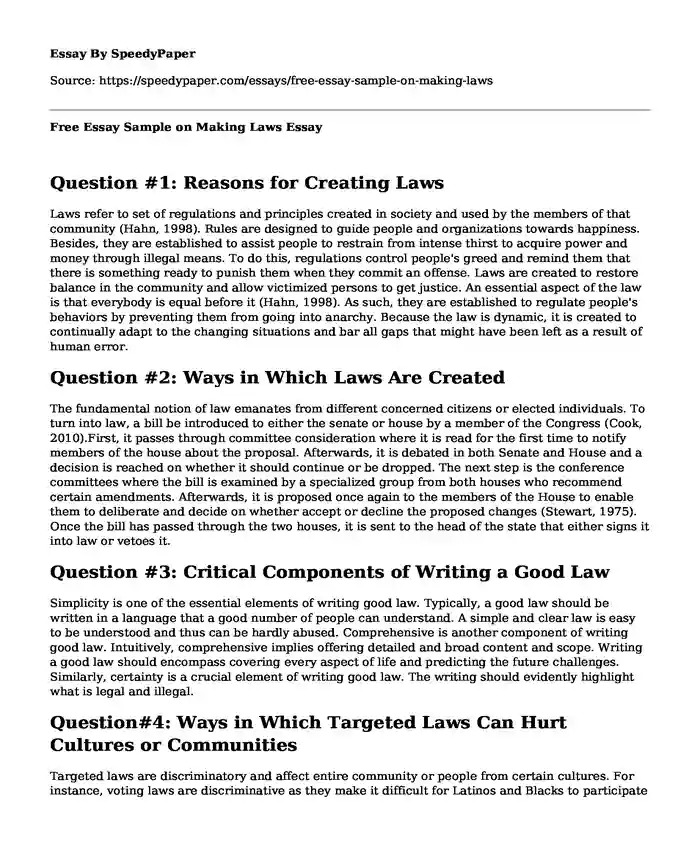Question #1: Reasons for Creating Laws
Laws refer to set of regulations and principles created in society and used by the members of that community (Hahn, 1998). Rules are designed to guide people and organizations towards happiness. Besides, they are established to assist people to restrain from intense thirst to acquire power and money through illegal means. To do this, regulations control people's greed and remind them that there is something ready to punish them when they commit an offense. Laws are created to restore balance in the community and allow victimized persons to get justice. An essential aspect of the law is that everybody is equal before it (Hahn, 1998). As such, they are established to regulate people's behaviors by preventing them from going into anarchy. Because the law is dynamic, it is created to continually adapt to the changing situations and bar all gaps that might have been left as a result of human error.
Question #2: Ways in Which Laws Are Created
The fundamental notion of law emanates from different concerned citizens or elected individuals. To turn into law, a bill be introduced to either the senate or house by a member of the Congress (Cook, 2010).First, it passes through committee consideration where it is read for the first time to notify members of the house about the proposal. Afterwards, it is debated in both Senate and House and a decision is reached on whether it should continue or be dropped. The next step is the conference committees where the bill is examined by a specialized group from both houses who recommend certain amendments. Afterwards, it is proposed once again to the members of the House to enable them to deliberate and decide on whether accept or decline the proposed changes (Stewart, 1975). Once the bill has passed through the two houses, it is sent to the head of the state that either signs it into law or vetoes it.
Question #3: Critical Components of Writing a Good Law
Simplicity is one of the essential elements of writing good law. Typically, a good law should be written in a language that a good number of people can understand. A simple and clear law is easy to be understood and thus can be hardly abused. Comprehensive is another component of writing good law. Intuitively, comprehensive implies offering detailed and broad content and scope. Writing a good law should encompass covering every aspect of life and predicting the future challenges. Similarly, certainty is a crucial element of writing good law. The writing should evidently highlight what is legal and illegal.
Question#4: Ways in Which Targeted Laws Can Hurt Cultures or Communities
Targeted laws are discriminatory and affect entire community or people from certain cultures. For instance, voting laws are discriminative as they make it difficult for Latinos and Blacks to participate in political process. Edward (1995) asserted that such exclusion is popularly known as voter suppression. Regrettably, voters who are eligible to exercise their democratic process cannot. Thus, the electorates are unrepresentative, and at times results of the election are skewed. The result is that persons from individual communities or cultures are unfairly hurt because they do not influence where to be born or raised.
Question #5: Politically Self-Service Laws and Quality of Democracy in the US
Politically self-service regulations such as strict voter identification requirements disenfranchise an excellent number of individuals including the elderly, the poor, as well as, minorities such as Latinos and Blacks. Besides limiting people from participating elections, the laws disqualify eligible voters because they had been sentenced for an offense sometimes back. A study by Sears, Hensler, and Speer (1979) revealed that several states in the US require former felons free from punishment to pass through the stringent and comprehensive process of restoring their rights to vote. The collective impact of these laws and regulations is that the quality of democracy is reduced and political underclass continues to grow in the US. Reportedly, these laws majorly influence the poor, but their specific effect extends to the marginalized communities as they deny them the chance to exercise their rights thus jeopardizing democracy.
References
Cook, T. (2010). Making laws and making news: Media strategies in the US House of Representatives. Brookings Institution Press.
Hahn, R. W. (1998). Policy watch: government analysis of the benefits and costs of regulation. Journal of Economic Perspectives, 12(4), 201-210.
Stewart, R. B. (1975). The reformation of American administrative law. Harvard Law Review, 1667-1813. Edward, F. (1995). How our laws are made. New York: DIANE Publishing Company.
Sears, D. O., Hensler, C. P., & Speer, L. K. (1979). Whites' opposition to "busing": Self-interest or symbolic politics? American Political Science Review, 73(2), 369-384.
Cite this page
Free Essay Sample on Making Laws. (2022, Mar 09). Retrieved from https://speedypaper.com/essays/free-essay-sample-on-making-laws
Request Removal
If you are the original author of this essay and no longer wish to have it published on the SpeedyPaper website, please click below to request its removal:
- Optimal Deployment of Emission Reduction Technologies, Essay Sample
- Free HR Essay: Employee Training and Career Development Paper
- Can God Give People a Hell Sentence? Free Essay on Religion
- Essay Sample Describing the Hunger in Iraq
- Teaching Essay Sample: Reading Mini-Lessons
- Essay sample: Impact of Immigrants Ban on Businesses and Consumers
- Essay Sample on Comparative Animal Behavior
Popular categories





